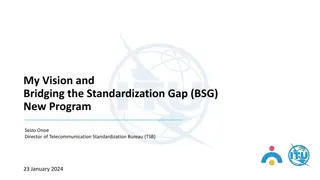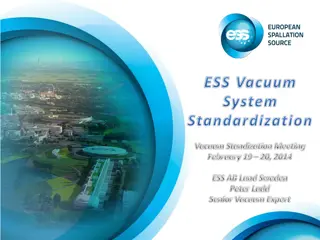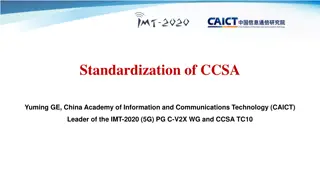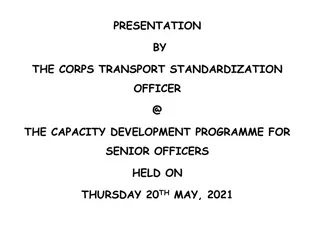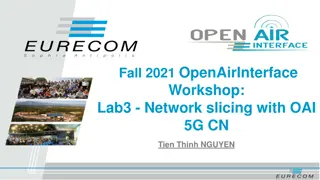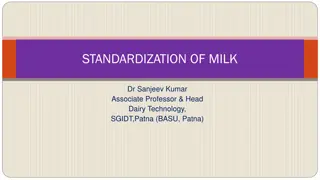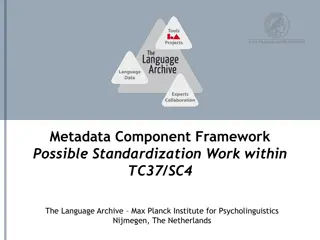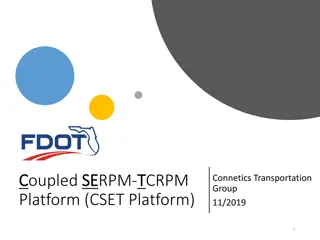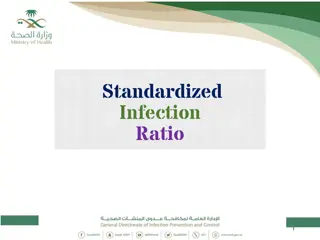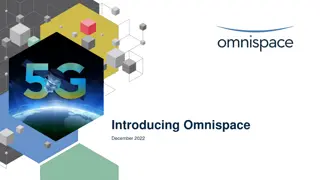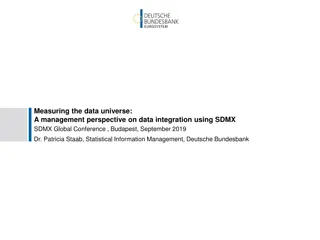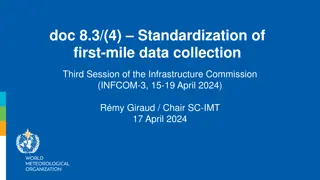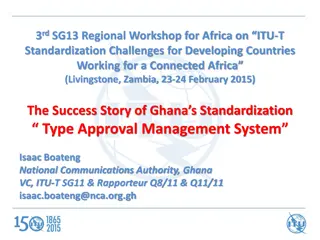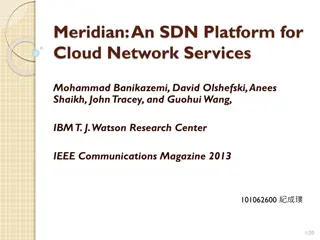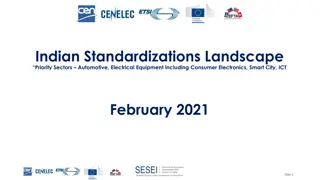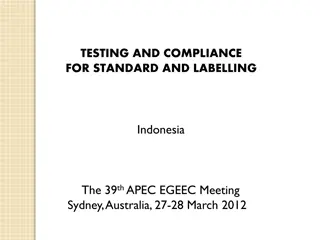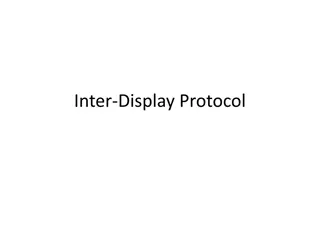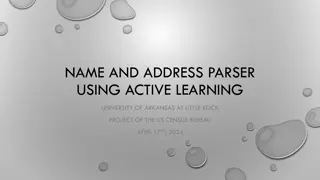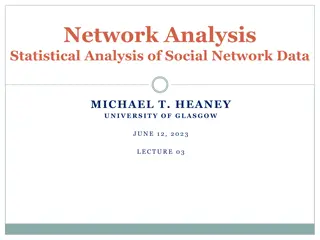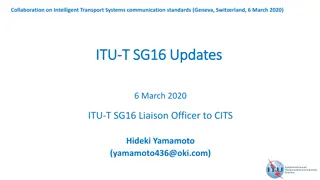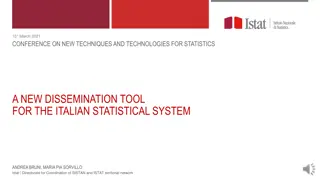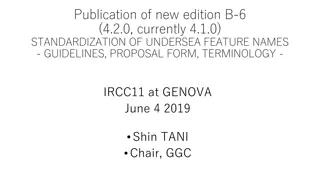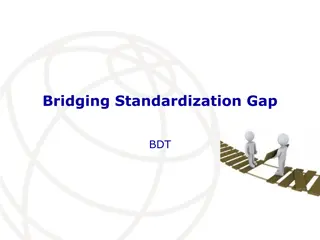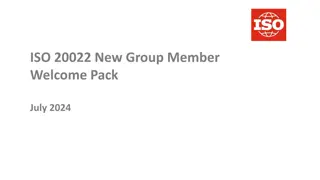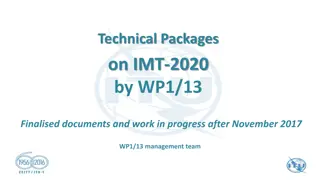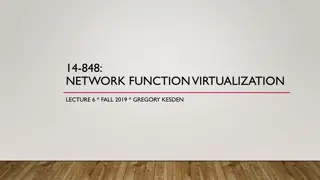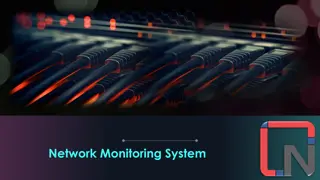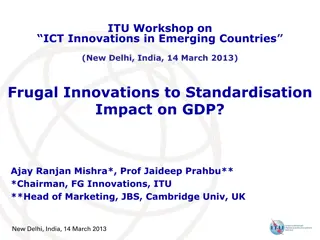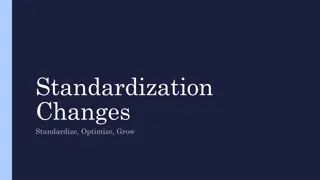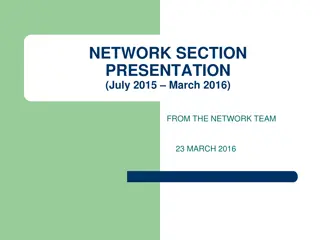Transforming Scientific Data Standardization with Large Language Models (LLMs)
Large Language Models (LLMs) to standardize scientific data, including data format standardization, automatic extraction of metadata, data annotation, data quality assessment, data cleaning, and documentation.
2 views • 5 slides
Standardization Concepts for CubeSat Applications
Understanding the importance of standardization in CubeSat applications, this document discusses the need for reliability and the adoption of SAVOIR standardization for avionics. It covers the mapping of SAVOIR functionalities into CubeSat architecture and explores how standardized practices can enh
2 views • 15 slides
Modeling and Generation of Realistic Network Activity Using Non-Negative Matrix Factorization
The GHOST project focuses on the challenges of modeling, analyzing, and generating patterns of network activity. By utilizing Non-Negative Matrix Factorization (NMF), realistic network activity patterns can be created and injected into live wireless networks. Understanding and predicting user behavi
4 views • 28 slides
My Vision and Bridging the Standardization Gap (BSG) New Program
Seizo Onoe, Director of Telecommunication Standardization Bureau, presents his vision for bridging the standardization gap, emphasizing the importance of industry engagement and wide adoption of standards for global benefit and market growth. By enhancing cooperation between standardization bodies a
1 views • 11 slides
ESS Vacuum System Standardization Meeting Overview
The ESS Vacuum System Standardization Meeting held in Lund, Sweden, focused on standardizing vacuum equipment and requirements for accelerator, target, and neutron scattering instruments. The scope of activities of the ESS vacuum team, vacuum requirements, integrated approach, and available faciliti
0 views • 8 slides
Standardization and Innovation in China's Telecommunication Sector
This content delves into the standardization efforts lead by Yuming GE from China Academy of Information and Communications Technology (CAICT) in the IMT-2020 (5G) field. It highlights the various technical committees and special task groups under CCSA responsible for different facets of communicati
1 views • 14 slides
Road Transport Safety Standardization: The Role of the Corps Transport Standardization Officer
The presentation highlights the Road Transport Safety Standardization policy and the role of the Corps Transport Standardization Officer in regulating fleet operators, ensuring safe transportation operations, and promoting a culture of safety consciousness. It covers the functions of the officer, im
1 views • 13 slides
Network Compression Techniques: Overview and Practical Issues
Various network compression techniques such as network pruning, knowledge distillation, and parameter quantization are discussed in this content. The importance of pruning redundant weights and neurons in over-parameterized networks is highlighted. Practical issues like weight pruning and neuron pru
0 views • 37 slides
Network Slicing with OAI 5G CN Workshop Overview
Overview of Network Slicing with OAI 5G CN workshop focusing on the crucial role of network slicing in realizing the service-oriented 5G vision. This workshop covers topics like multiple logical networks creation on shared infrastructure, different types of network slices, preparation and instantiat
1 views • 6 slides
Understanding Milk Standardization: Methods and Objectives
Milk standardization is the process of adjusting milk constituents to meet legal requirements and ensure product uniformity. This involves reducing butterfat content through addition of skim milk or removal of cream. The primary objectives include legal compliance, uniform product quality, and effic
0 views • 13 slides
Understanding Snort: An Open-Source Network Intrusion Detection System
Snort is an open-source Network Intrusion Detection System (NIDS) developed by Cisco, capable of analyzing network packets to identify suspicious activities. It can function as a packet sniffer, packet logger, or a full-fledged intrusion prevention system. By monitoring and matching network activity
0 views • 23 slides
Achieving Comparable Results in Laboratory Practice
Good laboratory practice necessitates minimal error in measurement to reflect a patient's biological condition accurately, ensuring comparable and reliable results regardless of testing location or method. Standardization, harmonization, and traceability play crucial roles in achieving uniformity an
0 views • 29 slides
Standardization Process for Metadata Components in Language Archives
The standardization process for metadata components within TC37/SC4 at the Language Archive Max Planck Institute involves analyzing existing metadata sets, seeking input from the CLARIN EU community, and determining the next steps for standardization. The process includes forming submission groups,
0 views • 23 slides
Transportation Network Modeling and Analysis with C.Coupled SE Platform
This content outlines the features and functionalities of the C.Coupled SE Platform (CSET Platform) developed by the Connetics Transportation Group. It covers aspects such as interface design, inputs merging, purposes, platform development using Cube, TAZs merging, and network attributes. The platfo
0 views • 11 slides
Understanding Standardized Infection Ratio (SIR) in Healthcare
The Standardized Infection Ratio (SIR) is a crucial metric used to monitor Healthcare-Associated Infections (HAIs) at various levels. It allows for improved risk adjustment and comparison by providing a single summary number. Standardization methods like direct and indirect standardization help in a
0 views • 44 slides
Omnispace: Redefining Global Mobile Connectivity with 5G NTN Technology
Omnispace, launching in December 2022, introduces the world's first global hybrid mobile network using 5G NTN technology to revolutionize mobile connectivity for consumer, enterprise, government, and IoT users. The innovative 5G hybrid architecture combines global NGSO coverage and mobile network ro
0 views • 10 slides
Managing Data Integration: A Management Perspective
The data universe is expanding rapidly, leading to challenges in organizing and extracting valuable information. Dr. Patricia Staab discusses the importance of integrating data using SDMX at the SDMX Global Conference in Budapest. The approach involves moving towards an application-driven architectu
0 views • 12 slides
Standardization of First-Mile Data Collection in Infrastructure Commission Session
The content discusses the importance of standardizing first-mile data collection in the context of the Infrastructure Commission's session. It highlights key decisions made regarding addressing issues related to lack of standardization and requests for collaboration among relevant committees. The Wo
0 views • 7 slides
Standardization in Composites and Speciality Fibres by A.K. Bera
This content highlights the standardization levels, composite material database standards, infrastructure at both national and international levels, chain of validation of composites products, and constituent material specifications and test methods in the textiles department under the Bureau of Ind
0 views • 18 slides
Standardization of Underwater Resources Assessment in Pacific Sea Cucumber Fisheries
This study focuses on the challenges in assessing sea cucumber fisheries in the Pacific, emphasizing the need for standardization in methodologies, data collection, and capacity building. Lessons from regional studies highlight the importance of comprehensive surveys and species identification. Capa
0 views • 21 slides
Innovations in Geotechnical Solutions: Enhancing Standards for Technical Textiles
Geotechnical expert Shahrokh Bagli discusses the importance of standardization for geosynthetics in India, highlighting the need for new products and innovations. Emphasizing the role of user ministries and applications, the conclave addresses the scope for standardization and the requirements of th
0 views • 9 slides
Enhancing Standardization with Ghana's Type Approval Management System
Exploring the success story of Ghana's Standardization Type Approval Management System at the 3rd SG13 Regional Workshop for Africa. Isaac Boateng from the National Communications Authority shared insights on the technical and regulatory requirements, challenges, and the importance of Type Approval
0 views • 18 slides
Meridian: An SDN Platform for Cloud Network Services
Meridian is an SDN platform developed by Mohammad Banikazemi, David Olshefski, Anees Shaikh, John Tracey, and GuohuiWang at IBM T. J. Watson Research Center. The platform focuses on providing cloud network services efficiently. It encompasses an architecture that enables faster and more convenient n
0 views • 21 slides
Indian Standardizations Landscape: Priority Sectors and Bodies Overview
Explore the Indian standardizations landscape focusing on priority sectors like automotive, electrical equipment, consumer electronics, smart city, and ICT. Gain insights into key players, initiatives of the Indian government, and major standardization bodies such as BIS, TSDSI, and TEC. Learn about
0 views • 68 slides
Energy Efficiency Standardization and Labeling Requirements in Indonesia
Indonesia's energy conservation efforts are outlined through government regulations requiring testing and compliance for energy efficiency standards and labeling. The regulations cover responsibilities of government and private sectors, as well as guidelines for energy performance standards and labe
0 views • 16 slides
Overview of Inter-Display Protocol Standardization with Wayland/Weston
This overview delves into the standardization of the Inter-Display Protocol using Wayland/Weston, focusing on sharing surfaces between ECUs and OSs. It explores the definition of the protocol at Wayland, receiver daemon, HMI transmitter plugin, Weston core, backend, adaptation plugins, and implement
0 views • 10 slides
Enhancing Name and Address Parsing for Data Standardization
Explore the project focused on improving the quality of name and address parsing using active learning methods at the University of Arkansas. Learn about the importance of parsing, entity resolution, and the token pattern approach in standardizing and processing unstructured addresses. Discover the
0 views • 11 slides
Understanding Network Analysis: Whole Networks vs. Ego Networks
Explore the differences between Whole Networks and Ego Networks in social network analysis. Whole Networks provide comprehensive information about all nodes and links, enabling the computation of network-level statistics. On the other hand, Ego Networks focus on a sample of nodes, limiting the abili
0 views • 31 slides
Recent Achievements in Intelligent Transport Systems Communication Standards
Recent achievements in Intelligent Transport Systems communication standards include the establishment of new focus groups, such as FG-AI4AD and FG-VM, to drive standardization activities for AI in autonomous driving and vehicular multimedia. These groups aim to improve safety, performance, and publ
0 views • 10 slides
New Dissemination Tool for Italian Statistical System - Conference Highlights
The 10th March 2021 Conference on New Techniques and Technologies for Statistics showcased a new dissemination tool for the Italian Statistical System presented by Andrea Bruni and Maria Pia Sorvillo from Istat. The project focuses on improving data dissemination quality, hub architecture in pull mo
0 views • 7 slides
Revised Guidelines for Standardization of Undersea Feature Names - Edition B-6 (4.2.0)
Updates in the new edition (4.2.0) of the Standardization of Undersea Feature Names - Guidelines, Proposal Form, and Terminology include the removal of the list of national authorities, emphasis on marine research-related names, improved name proposing procedures, and the introduction of a Fast-Trac
0 views • 8 slides
Bridging the Standardization Gap in ICT Development
Participation in ICT standardization processes is essential for bridging the gap between developed and developing countries. Strong standards aid in establishing technical requirements, ensuring safe and interoperable ICT equipment, and reducing the digital divide. Initiatives such as capacity build
0 views • 15 slides
Overview of ISO 20022 Standardization and Governance Framework
ISO 20022 is a comprehensive standardization approach for financial services, emphasizing common methodologies, processes, and repositories. The ISO 20022 Welcome Pack outlines key ingredients, development processes, and the eight essential parts of ISO 20022. Governance is managed by the Registrati
0 views • 25 slides
Overview of IMT-2020 Technical Packages by WP1/13
The IMT-2020 technical packages by WP1/13 consist of various documents related to softwarization, fixed-mobile convergence, and information-centric networking. These packages include terms and definitions, management frameworks, network requirements, architecture, orchestration for network slicing,
0 views • 5 slides
Network Function Virtualization (NFV) Overview
Network Function Virtualization (NFV) focuses on virtualizing network functions to improve efficiency and reduce costs in network infrastructure. The lecture discusses key readings, devices that compose a network, specialization of devices, benefits of one-device-does-anything approach, and the goal
0 views • 21 slides
Enhancing Network Stability with Network Monitoring Systems
Network monitoring is crucial for efficient management and proactive issue detection in a network environment. Factors influencing an effective network system include choosing the best OEM, SLA agreements, and selecting a reliable System Integrator. Reactive monitoring can lead to financial losses a
0 views • 12 slides
The Impact of Frugal Innovations and Standardization on GDP Growth in Emerging Countries
This content discusses the role of standardization in economic growth, showcasing case studies from Germany, UK, Canada, and Australia. It also highlights insights from the Global Innovation Index on top innovative countries. The analysis questions the relationship between connectivity, innovation a
0 views • 6 slides
Standardization Changes for Organizational Growth
Initiating standardization in organizational structures and processes allows for optimization of efforts, leading to growth and sustainability. This involves setting deadlines for various standardization milestones like email, dues, officer roles, and elections, emphasizing the importance of uniform
0 views • 28 slides
Accelerating Systemic Change Network Inaugural Workshop Summary
The Accelerating Systemic Change Network held its inaugural workshop at Howard Hughes Medical Institute in July 2016 to address the lack of coordination in improving higher education. With a vision to become a professional hub for change researchers in STEM education, the network aims to enhance ind
0 views • 5 slides
University Network Section Overview July 2015 - March 2016
The presentation covers the network team structure, team members, objectives, goals, report outline, network statistics, accomplishments, and future plans of the university network section from July 2015 to March 2016. It highlights efforts to provide stable internet and intranet services, restructu
0 views • 16 slides



